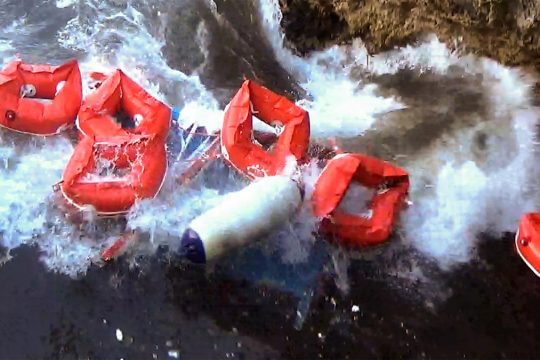Radical Serb leader Vojislav Seselj was acquitted Thursday on all charges arising from the 1990s Balkan conflicts in the latest verdict handed down by the UN's International Criminal Tribunal for the former Yugoslavia.
The court has indicted 161 people, convicting 80 and acquitting 19 including Seselj while four are still on trial.
Here is a rundown of the fate of some other key players in the wars:
- Slobodan Milosevic -
Known as the "Butcher of the Balkans", Milosevic fuelled ethnic conflict and mass murder in the former Yugoslavia during his 13 years of iron rule, defying international sanctions and NATO bombs.
He was elected president of Serbia -- a constituent republic of the Yugoslav federation -- in 1990. A year later the break-up of Yugoslavia began with declarations of independence by Croatia and Slovenia.
Milosevic played a key role in supporting Serb rebels during the 1991-95 Croatian war and the 1992-95 war in Bosnia. In 1998-99 he oversaw a bloody crackdown on ethnic Albanians in Kosovo.
He was found dead in his cell in 2006 at the age of 64 while still awaiting the verdict on charges of genocide, war crimes and crimes against humanity.
- Radovan Karadzic -
The former Bosnian Serb political leader was found guilty on March 24, 2016 of genocide and nine other charges including extermination, deportations and hostage-taking and sentenced to 40 years in jail.
He was convicted of genocide for the 1995 Srebrenica massacre in which almost 8,000 Muslim men and boys were slaughtered, the worst bloodshed on European soil since World War II.
Karadzic, 70, is the most high-profile figure convicted over the wars that tore Yugoslavia apart.
He managed to evade arrest for 13 years until 2008 when he was arrested on a Belgrade bus, masquerading behind a bushy beard as a New Age healer.
- Ratko Mladic -
The notorious military leader of Serb rebels in Bosnia is accused of presiding over the bloody 44-month siege of Sarajevo from 1992-1996 and the Srebrenica massacre.
After almost 16 years in hiding Mladic, 73, was arrested in Serbia in 2011 and is on trial on multiple charges of genocide, war crimes and crimes against humanity.
The court is expected to deliver its verdict next year against Mladic, the last high-ranking Bosnian Serb to face judgement.
- Vojislav Seselj -
Seselj, 61, a Milosevic ally and hardline leader of the Serbian Radical Party, was accused by prosecutors of being behind the murder of many Croat, Muslim and other non-Serb civilians, as well as the forced deportation of "tens of thousands" from large areas of Bosnia, Croatia and Serbia.
However, the ICTY acquitted him in a surprise verdict branded "shameful" by Croatia. The judges found that although crimes were committed, Seselj had not had "hierarchial" responsibility for his paramilitary forces after they came under Serbian army control and could not be held responsible for their crimes.
The verdict clears the way for him to stand unencumbered in April's election in Serbia.
- Franjo Tudjman -
Tudjman was a fervent nationalist elected in 1990 to lead the Croatian republic, which he took out of the Yugoslav federation the following year.
The ensuing four-year war between Croatian government forces and Serb secessionists left some 20,000 people dead.
A year after Tudjman died in 1999 at the age of 77, the ICTY said he would have been indicted for war crimes had he lived.
- Alija Izetbegovic -
Bosnia's first president was a Muslim who led the country to independence in 1992 in a move that triggered the 1992-1995 war between Muslims, Serbs and Croats. In the post-war period Izetbegovic filled the Muslim seat in the tripartite presidency that also includes a Croat and a Serb. He stepped down in 2000 due to failing health and died three years later aged 78.
After his death, the ICTY said it had been investigating Serb allegations that he committed war crimes, but no charges were ever brought.
- Biljana Plavsic -
The former Bosnian Serb president -- the first woman to be convicted by the ICTY -- pleaded guilty to crimes against humanity and was sentenced to 11 years in jail in 2003.
She was found to have played a leading role in a campaign of persecution against Croats and Muslims during Bosnia's war.
Now 85, she was granted an early release in 2009.
- Ante Gotovina -
An army general considered a war hero by many Croatians for his role in the military offensive that effectively ended the war, Gotovina, 60, was indicted in 2001 for war crimes. He went into hiding but was arrested in Spain in 2005 and sentenced six years later to 24 years in jail. He was acquitted on appeal in 2012.
- Ramush Haradinaj -
Haradinaj, a wartime rebel chief of the Kosovo Liberation Army (KLA)and a former Kosovo prime minister, was charged with war crimes against Serb civilians during the 1998-1999 conflict in Kosovo.
The ICTY acquitted Haradinaj, 47, in 2012 but the case was marred by accusations the court had failed to protect witnesses.





